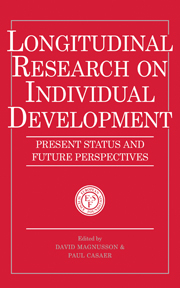Book contents
- Frontmatter
- Contents
- List of principal contributors
- Foreword
- Preface
- 1 Human ontogeny: a longitudinal perspective
- 2 Genes, experience and development
- 3 The human brain and longitudinal research in human development
- 4 Longitudinal research and a biology of human brain development and behaviour
- 5 Cognitive, social and emotional development
- 6 Developmental psychopathology: some historical and current perspectives
- 7 Developmental psychopathology as a research perspective
- 8 Longitudinal research on human aging: the power of combining real-time, microgenetic and simulation approaches
- 9 Development, aging and control: empirical and theoretical issues
- 10 Some methodological issues in longitudinal research: looking ahead
- Index
10 - Some methodological issues in longitudinal research: looking ahead
Published online by Cambridge University Press: 22 March 2010
- Frontmatter
- Contents
- List of principal contributors
- Foreword
- Preface
- 1 Human ontogeny: a longitudinal perspective
- 2 Genes, experience and development
- 3 The human brain and longitudinal research in human development
- 4 Longitudinal research and a biology of human brain development and behaviour
- 5 Cognitive, social and emotional development
- 6 Developmental psychopathology: some historical and current perspectives
- 7 Developmental psychopathology as a research perspective
- 8 Longitudinal research on human aging: the power of combining real-time, microgenetic and simulation approaches
- 9 Development, aging and control: empirical and theoretical issues
- 10 Some methodological issues in longitudinal research: looking ahead
- Index
Summary
THE NEED FOR A LONGITUDINAL APPROACH
Longitudinal studies are vital for studying individual development and cannot normally for this purpose be replaced by other kinds of studies. This has been asserted many times (see Chapter 1 in this volume; Magnusson, 1988; Mednick, Harway & Finello, 1984). The main reason for using a longitudinal approach is really common-sense: If you want to understand how an individual develops over time, you have to study the individual over time. All other approaches are more indirect and have to make questionable assumptions for the results to be applicable for statements about individual development. For overviews of longitudinal versus other designs, the reader is referred to Bakes (1968) and Bakes and Nesselroade (1979).
The above should not be interpreted to mean that a longitudinal study always is necessary when development or change is to be studied. For instance, within epidemiology, a case-control study can be faster, cheaper, and more efficient than a longitudinal study for the (preliminary) study of the aetiology of a certain decease.
THE RESEARCH PROCESS
The research process can be described as having the following components:
1 The process starts from the specific aspect of reality that is at the focus of enquiry.
2 By some kind of data collection procedure, the raw data are produced.
3 The raw data are often further processed to give the variable values used in the analyses (transformed, summed to form indices and so on).
4 Statistical analyses are performed.
5 The results are interpreted in relation to the theoretical formulations.
[…]
- Type
- Chapter
- Information
- Longitudinal Research on Individual DevelopmentPresent Status and Future Perspectives, pp. 217 - 241Publisher: Cambridge University PressPrint publication year: 1993
- 7
- Cited by



